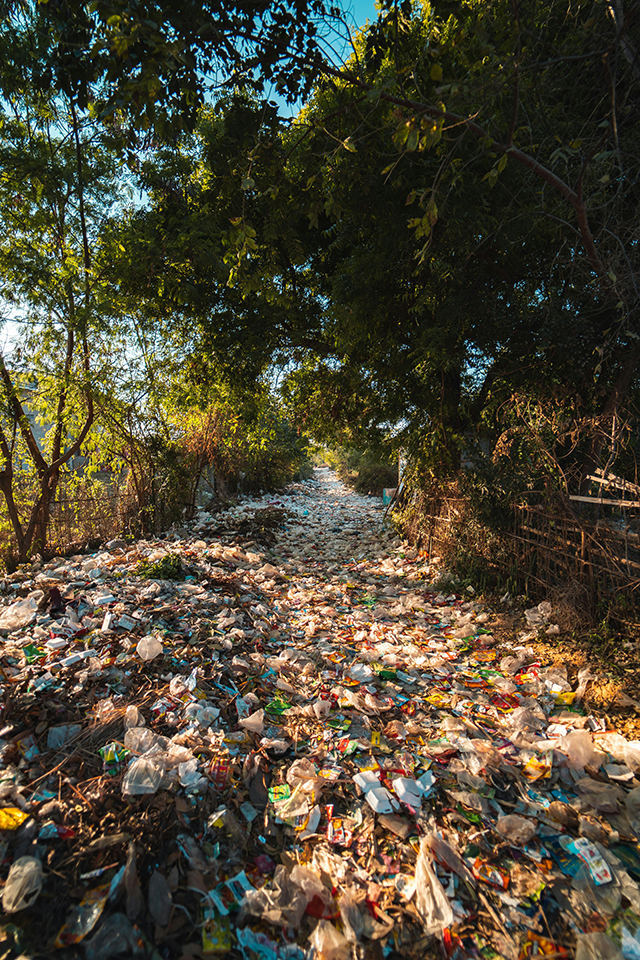
Photo of plastics near trees. Myanmar (Burma). Photo by Stijn Dijkstra, Pexels.
The global plastic pollution crisis, driven by major corporations, has reached alarming levels. The recent study “Global Producer Responsibility for Plastic Pollution,” published in Science Advances, reveals a direct link between corporate plastic production and the branded waste found polluting our planet.
Key Findings of Plastic Pollution and Corporate Influence
The study, conducted over five years (2018-2022) across 84 countries, with particularly robust coverage in Southeast Asia, Africa, Europe, and North America, analyzed over 1,500 brand audits to quantify the sources of plastic pollution. The findings are staggering:
- Just 56 companies accounted for over 50% of all branded plastic pollution documented globally.
- The top contributors include The Coca-Cola Company at 11%, followed by PepsiCo (5%), Nestlé (3%), Danone (3%), and Altria (2%).
- There was a clear linear relationship between a company’s plastic production levels and the amount of its branded plastic pollution found in the environment.
- Food and beverage companies producing single-use plastics were disproportionately higher polluters compared to their production volumes.
- A startling 50% of the plastic pollution items found were completely unbranded. This highlights the need for improved labeling to identify polluter sources and hold companies responsible.
These results show evidence that major corporations are driving the global plastic crisis through their excessive production of disposable plastic products and packaging. Food and beverage companies, which produce many single-use plastic products, were disproportionately higher polluters relative to their production volumes compared to companies making longer-lasting household and retail products.
There were noticeable gaps in data from regions like South America, central and north Asia, the Middle East, and central Africa.
Strategies for Reducing Corporate Plastic Pollution
To combat global plastic pollution effectively, the study suggests several strategies:
- Phase out non-essential single-use plastics: Corporate polluters, especially the largest polluters identified, need to eliminate unnecessary single-use plastic products.
- Invest in alternative materials: Develop and utilize safer, sustainable materials.
- Implement reuse and refill systems: Promote systems that reduce the need for single-use packaging and promote and alternative materials.
- Maintain standards of transparency and accountability: Develop international standards for packaging labeling and branding.
The study also revealed that 50% of plastic pollution items found were completely unbranded, highlighting a critical lack of transparency and traceability. To address this, the researchers recommend the creation of an international, open-access database where companies would be required to report their plastic pollution – from production to waste.
By holding corporations accountable and compelling them to fundamentally shift away from single-use plastics, we can move towards tackling the plastic pollution crisis. This data-driven approach provides a clear roadmap for environmental activists, policymakers, and concerned citizens to demand urgent action from the world’s largest plastic polluters.
The Role of Transparency and Accountability
The study recommends creation of an open-access global database where companies must quantitatively track and report their plastic product and packaging data, as well as releases into the environment.
There is yet no single, comprehensive global database that mandates reporting of all corporate plastic production and waste; however, there are several initiatives that aim to increase transparency and accountability.
- The Global Commitment and Plastic Pact Network led by the Ellen MacArthur Foundation requires members to track and report their progress on plastic waste reduction. The Plastic Disclosure Project also encourages companies to voluntarily report their plastic pollution.
- The European Union has implemented directives requiring companies to report on packaging and waste.
- The Global Plastic Action Partnership also engages stakeholders to shape national action plans on plastic pollution.
- Some countries have Extended Producer Responsibility (EPR) legislation, which requires producers to report on production, recycling, and waste management activities.
Mobilizing Stakeholders for Action
The clear link established between corporate plastic production and environmental pollution underscores an urgent need for systemic changes in how plastic products are produced, used, and disposed of. With a significant portion of plastic pollution traceable back to a handful of major corporations, especially those producing single-use plastics, the path forward requires a combined effort of corporate innovation and robust governmental regulation. By focusing on extended producer responsibility and encouraging sustainable alternatives, we can significantly reduce plastic pollution and move towards a more circular economy. It is crucial for governments, corporations, and consumers to work together to implement these changes and preserve our environment for future generations.
No More Excuses
The era of excuses and inaction has ended. We must hold these corporations accountable for their contributions to the plastic pollution crisis.
Source: Cowger, W., Willis, K. A., Bullock, S., Conlon, K., Emmanuel, J., Erdle, L. M., Eriksen, M., Farrelly, T. A., Hardesty, B. D., Kerge, K., Li, N., Li, Y., Liebman, A., Tangri, N., Thiel, M., Villarrubia-Gómez, P., Walker, T. R., & Wang, M. (2024). “Global producer responsibility for plastic pollution.” Science Advances, 10(eadj8275).
